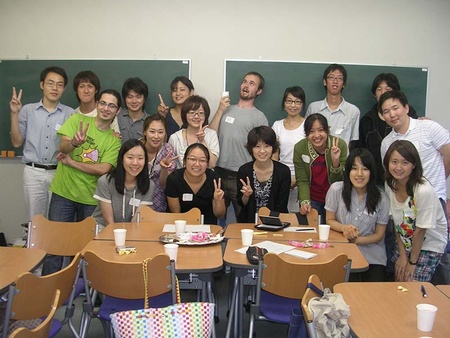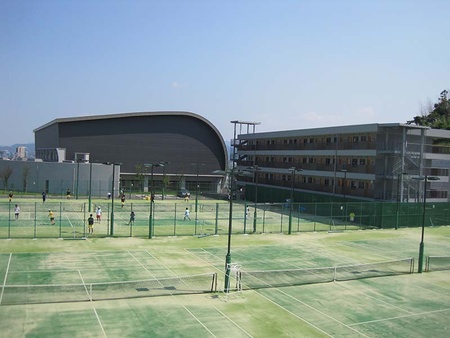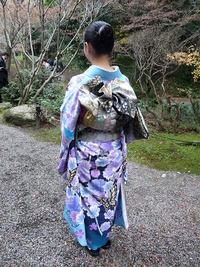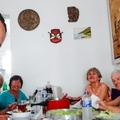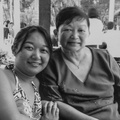At home, in Brazil, we always talked in Portuguese. During my adolescence, I attended Japanese classes because my parents wanted that, but honestly I did not give much importance. After stopping the classes, I didn´t use Japanese anymore and I forgot much of what I learned. Of course today, I am grateful for my parents´ efforts and for how much consideration they had in my upbringing. There are things in life that we just realize after some time and maturity.
I'm a third generation Nikkei and my grandparents were born and lived most of their lives in Fukuoka prefecture, so I contemplated applying for a scholarship to study abroad in my grandparent’s hometown. Before deciding to go to Japan as an exchange student, I had some misgivings, as I was in the beginning of my career. After talking with many friends and people more experienced than me, I decided to go to Japan. I realized that this opportunity to learn about the country and area where my grandparents were born would not come again.
Shortly before leaving, I was worried, thinking that I would be unable to communicate with Japanese people or understand, for example, what would be said in the classroom. When I arrived in Japan, I couldn´t answer many questions and it made me sad, but at the same time encouraged me to learn more. As language is necessary for almost everything you do, both reading and conversation, you see no alternative but to learn it. With time and interest, naturally, you start to assimilate the language without noticing. After six months in Japan, I wondered, "In six months, it seems that nothing evolved, I can´t speak Japanese yet." However, in fact, I forgot the first days in Japan, when I needed to listen very carefully to what people spoke to me and even with that, I couldn´t understand many of the words. When I asked the person to explain again, I still did not understand. What despair and disappointment I had! But now, even without understanding all that I am speaking and not knowing how to convey all that I want, I no longer have that feeling. I ask again what I did not understand until people explain to me with words that are part of my vocabulary. If you asked for my advice, if you are thinking about going to Japan to study Japanese, study before, a little every day - however much you can - would be a big help.
The Japanese classes I attended helped me to learn new words, grammar and kanji . With a bit more knowledge of basic grammar, you start to improve your conversation as well. I was very fond of learning foreign languages like English and Spanish, besides studying on my research.
At the beginning of my classes, I felt frustrated because there were many difficult technical terms that were used in the classroom. I looked up the words in the dictionary, but because there were many kanji and new words, I always forgot. In the next classroom, there was me, looking for the same word again. I felt sad to have bad memory. But I began to understand that looking several times for the same word in the dictionary, meant part of the study and helped me to memorize. It takes patience, I confess that I didn´t have patience 100% of the time. But now, knowing that those many repetitions have produced a good effect makes me feel happy.
In June, I went to meet a group of students who practiced badminton, so I could practice my Japanese and learn more about the lives of Japanese students. They were very nice to me. However, I chose not to participate because they were doing intense training and attended competitions, using their vacations to travel to competitions. I was very impressed with the level of training and their skills. This type of activity is very common among Japanese universities. There is a good diversity of groups that meet centered around a common interest, not only sports, but also hobbies.
The campus where I studied was new and more buildings were being built rapidly. I was surprised at the speed of construction and also happy to study in a new and modern campus, which had even a well-equipped gymnasium.
When I was not in Software Engineering classes, I was in the lab or the library doing lessons, studying Japanese, and also issues related to my research on international standards of software quality. I studied a little about the importance of this subject for some Japanese companies for technology and their interest in the concept of quality.
The time spent at the dormitory where I lived was also a big part of my experience. Meant not only a place for living, but also a place to meet people from around the world and create memories that will last a lifetime.
My year in Japan as an exchange student was an amazing experience. I will always remember with love the experiences I had and the people I met. It was great to live in a city so friendly. Fukuoka is a nice place to live. I will miss the food, its sights, the nice people. After living in Fukuoka, the lifestyle and culture of this region became special to me. I think my grandparents missed Fukuoka when they came to Brazil!
My mother passed away from cancer a while ago. She lived in Japan for some years, enjoyed and wanted to return one day. I thought that if I went to Japan again, even better if it was as a student, she would be very happy and proud of me, wherever she was. During all my experiences in Japan, I believe she was present and shared with me the moments of happiness, new discoveries, moments of sadness and doubts.
I had a memorable homestay experience; I learned about the process of planting rice, see the holiday fireworks and wear a beautiful kimono. These are examples of things that I could not have opportunity to do in Brazil.
I thank the Fukuoka Prefecture, the Fukuoka Foundation for International Exchange, Brazil Fukuoka Kenjinkai, the University of Kyushu, my teachers, relatives and friends, for all the support I received. Thanks to everyone who helped me during this period of my life.
© 2010 Silvia Lumy Akioka


